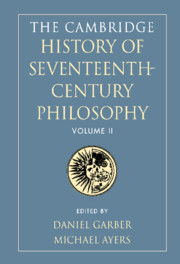32 - Scepticism
from VI - The Understanding
Published online by Cambridge University Press: 28 March 2008
Summary
In the seventeenth century more than in many other periods of philosophy, scepticism was a fundamentally important philosophical phenomenon. Charron, Pascal, and Bayle are among the greatest sceptical thinkers. And Montaigne as well belongs to this period, for although he died eight years before the century began, he was the central figure in its debate about scepticism. These philosophers argued persistently and imaginatively against the possibility of knowledge in natural science, ethics, and theology, and they developed novel and powerful views of how the sceptical outlook is to be understood. Scepticism was also important because almost every major philosopher who was not a sceptic believed that a decisive feature of his own position was how it differed from scepticism. Some of these philosophers (the ‘mitigated sceptics’ such as Mersenne and Gassendi) tried to show that a great deal of scepticism could be accepted without abandoning all possibility of knowledge or without leaving reason idle even where knowledge was not possible. Others (such as Bacon and Descartes) tried to work out a new conception of the sources of knowledge which would prove immune to doubt. In general, the issue of scepticism was one around which many of the most important developments in seventeenth-century philosophy crystallised.
- Type
- Chapter
- Information
- The Cambridge History of Seventeenth-century Philosophy , pp. 1145 - 1192Publisher: Cambridge University PressPrint publication year: 2000
References
- 3
- Cited by



